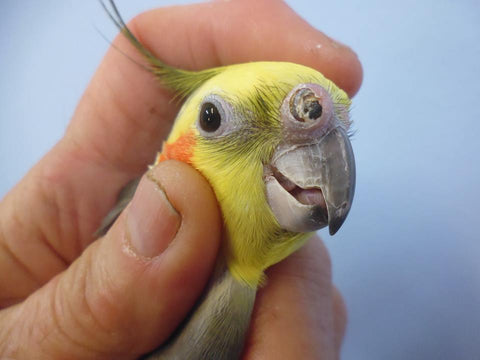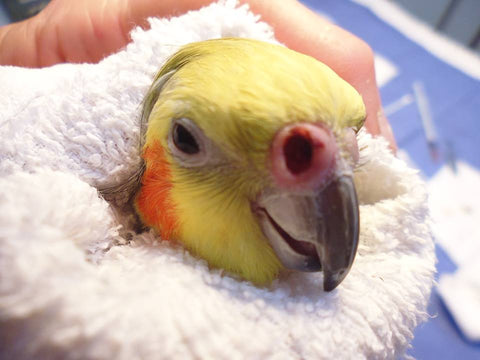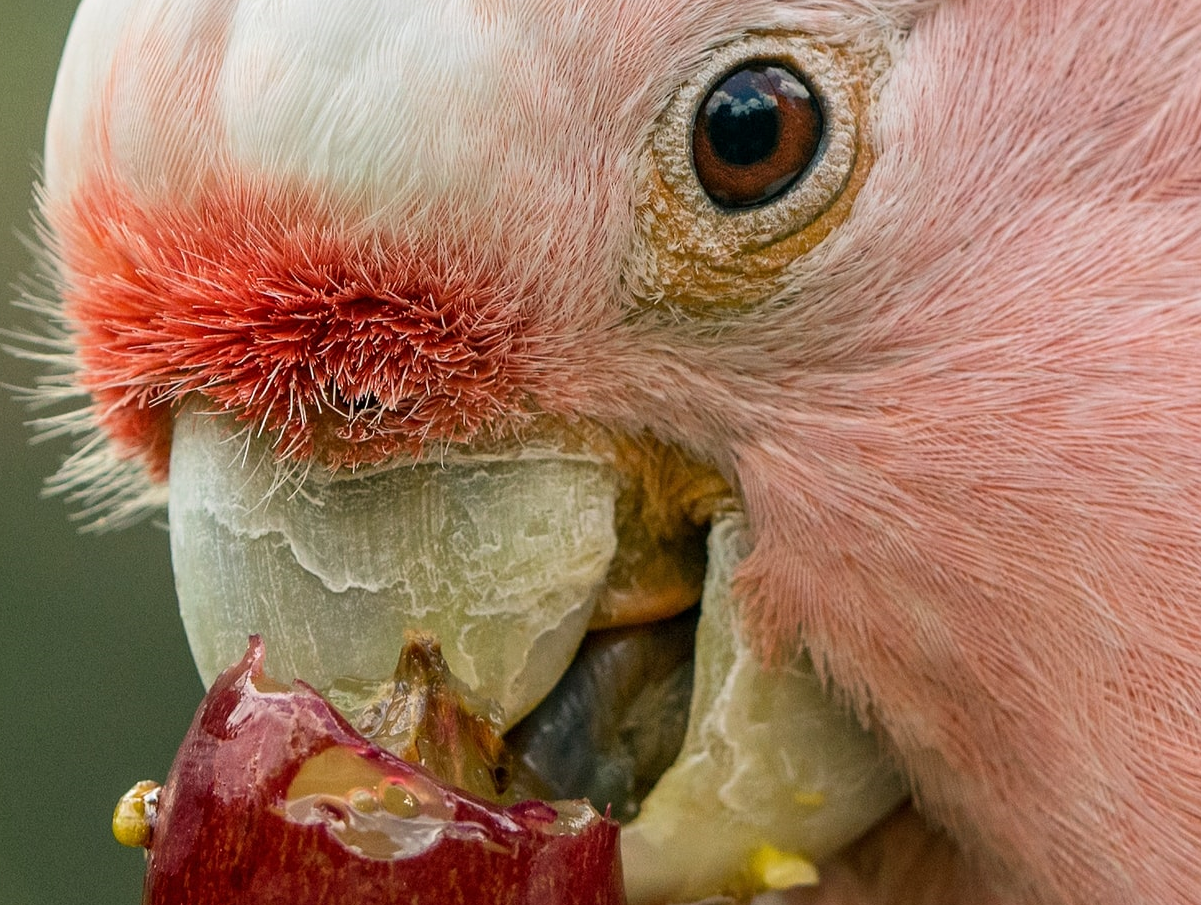Table of Contents
- What Causes Bird Vitamin A Deficiency?
- How is Vitamin A Deficiency in Birds Diagnosed?
- What Does Vitamin A Do for Your Bird?
- What Diseases Does Vitamin A Deficiency Cause In Our Avian Companions
- How Do You Increase Vitamin A In Your Birds Diet?
- What Can You Do To Help Your Bird Recover From Vitamin A Deficiency?
Bird vitamin A deficiency is one of the most common, yet preventable, health issues in pet birds—and it can seriously impact their well-being.
While many bird owners still believe seed diets are sufficient, relying solely on seeds or pellets can lead to dangerous nutrient gaps.
Research now shows that birds thrive on a varied diet rich in fresh vegetables and scientifically-formulated pellets. Without enough vitamin A, your bird’s skin, respiratory system, vision, and immune health can all suffer. Don't let this preventable deficiency put your bird at risk!
What Causes Bird Vitamin A Deficiency?
You might think feeding your bird pellets gives them all the nutrients they need. But not all pellets are the same. During the cooking process, important nutrients like vitamin A can be lost. That’s why it’s essential to add foods rich in beta-carotene to your bird’s diet. Beta-carotene, found in carrots, sweet potatoes, and leafy greens, helps birds convert it into the vitamin A they need to stay healthy.
Vitamin A deficiency, or hypovitaminosis A, is one of the most common health issues in birds, and it's totally preventable. Sadly, it often goes unnoticed at home because the symptoms are subtle. This deficiency can affect a bird’s skin, their respiratory system, and even their vision. Dry, flaky skin and irritated eyes are common signs. A quick check-up with an avian vet can easily catch this problem before it worsens.
Many birds on seed-only diets are prone to vitamin A deficiency because seeds are low in essential vitamins. But even birds on high-quality pellets can suffer if their food loses nutrients during processing. That’s why adding fresh fruits and veggies to your bird's meals is so important.
Be careful, though—too much vitamin A can also be harmful. If your bird gets too many multivitamins or too much vitamin A from supplements and certain veggies, they could develop hypervitaminosis A, which can cause symptoms like rashes, stomach pain, and vomiting.
How is Vitamin A Deficiency in Birds Diagnosed?
According to the Merck Vet Manual, birds with vitamin A deficiency can show several clear signs that are easy to spot. These include:
- Runny nose or frequent sneezing
- Swelling around the eyes or red, irritated eyes (conjunctivitis)
- Trouble breathing (shortness of breath or wheezing)
- Drinking and urinating more than usual
- Poor feather condition, or even feather picking
- Loss of appetite (anorexia)
One of the first things many avian vet's look for is changes in the bird's mouth. Healthy birds have small, sharp projections inside the mouth, called the choanal papilla. They look like sharks teeth.
The projections can become blunted or even disappear due to vitamin A deficiency. If you notice any of these symptoms, it’s important to visit your avian vet as soon as possible to check for vitamin A deficiency.

Say aaaaah! Orla shows us her choanal papillae!
https://www.facebook.com/beacvet
What Does Vitamin A Do for Your Bird?
Vitamin A is essential for the growth and maintenance of epithelial tissues in birds, such as those found in the skin, respiratory system, and digestive tract. It plays a critical role in immune function, vision, and overall vitality.
Epithelial tissue is essential because it helps the body stay clean and healthy. It produces mucus, which traps dust, dirt, and bacteria, preventing them from entering deeper into the body. In the lungs, it helps the bird breathe safely, and in the digestive tract, it helps absorb nutrients from food. It also covers the preening gland, which keeps the bird's feathers in good condition.
Without healthy epithelial tissue, your bird is more likely to get infections or illnesses because its natural defense barriers are weakened. That’s why keeping it strong with a proper diet rich in vitamin A is so important for your bird’s overall health.

Notice how the symptoms relate to the exact areas and organ systems where the epithelial tissue is?
- Nasal discharge & clogged nasal cavities
- Sneezing
- Eye swelling or discharge
- Trouble breathing
- Very watery droppings
- Very thirsty
- Poor appetite
- Poor feather quality or feather plucking
- Compaction of the preening gland
What Diseases Does Vitamin A Deficiency Cause in Birds
1. Respiratory Infections
When a bird doesn’t get enough vitamin A, the epithelial tissue in the respiratory system weakens. This makes it easier for bacteria and fungi to cause infections in the lungs and airways. Symptoms like wheezing, coughing, and difficulty breathing are warning signs that need immediate attention.
Before and after shots of a cockatiel with nasal obstruction from vitamin A deficiency


2. Oral Abscesses
Vitamin A deficiency can lead to painful abscesses in a bird's mouth and throat. These abscesses appear as white or yellowish lumps and can make it hard for your bird to eat or breathe. Left untreated, they can grow and block the airways, leading to severe complications.
3. Blunted Choanal Papillae
The choanal papillae, small spiky projections in a bird’s mouth, can become blunted or disappear when vitamin A is lacking. This weakens their ability to filter out particles, increasing the risk of infections in the respiratory system.
4. Squamous Metaplasia
This condition occurs when healthy mucus-producing cells are replaced with thicker, non-functioning cells. Without enough mucus to protect the respiratory and digestive tracts, birds become more vulnerable to infections and digestive issues.
5. Kidney Disease
A lack of vitamin A can lead to changes in the kidneys, causing them to become inflamed or fail over time. This can result in excessive drinking, urination, and eventually kidney failure, which is often fatal if not addressed early.
6. Conjunctivitis (Eye Infections)
Vitamin A deficiency can also cause infections around the eyes, leading to swelling, redness, and discharge. If left untreated, these infections can damage a bird’s vision and even lead to blindness.
7. Hyperkeratosis
This condition causes the skin to thicken and become scaly, particularly around the feet and beak. Birds with hyperkeratosis may develop sores or cracks in their skin, which can become infected if not treated properly.
These diseases are serious and can be life-threatening if not caught early. Symptoms like difficulty breathing, swollen eyes, or changes in eating habits are more than just warning signs—they’re red flags that your bird may need more vitamin A in its diet. Ensuring a balanced diet rich in vitamin A can prevent these dangerous conditions.
How To Increase Vitamin A In Your Birds Diet
To prevent vitamin A deficiency, ensure your bird’s diet includes about 40% high-quality pellets and fresh, nutrient-rich raw foods. You can find organic produce at local grocery stores or farmer’s markets, and even growing your own herbs and veggies is a great way to provide fresh, healthy options. A varied diet is essential for your bird’s overall health!

Photo by Getty Images used under license from PicMonkey
Many of our pet birds simply haven’t been taught to eat plant-based foods. Make it a point to watch my video on 9 Ways To Get Your Bird To Eat Vegetables.
Avian naturals like Bird Greens, SereniTea, and Red Palm Oil are packed with vitamin A and other essential nutrients. These help support your bird’s skin, vision, and immune health, making them a great addition to prevent vitamin A deficiency and keep your bird healthy and thriving.
UnRuffledRx Rainbow Bird Chop
INSTRUCTIONS:
All birds should be given fresh, uncooked foods that are rich in vitamin A. Look for red or orange vegetables and fruits like carrots, red peppers, mango, squash, papaya, parsley, cantaloupe, and sweet potatoes. Dark green leafy vegetables like broccoli, spinach, collard greens, turnip greens, and kale are also vitamin A rich.
UnRuffledRx Red Palm Oil is another rich source of vitamin A, beta carotenes and antioxidants. It’s a great source of good fats, essential fatty acids! We make our red palm oil in a way that preserves nutritional goodness so that it offers vital support for reproduction, feather production and a healthy immune system.
Birds that prefer seeds should be given a commercial parrot vitamin supplement, sprinkled on their food or in water. UnRuffledRx FeatherUp! is a daily multivitamin, mineral and amino acid supplement for pet birds. It’s also rich in biotin to support feather growth. It’s part of a healthy diet that helps maintain the overall health of your pet bird.
How You & Your Vet Resolve Vitamin A Deficiency
Your vet will examine your bird and may perform some lab tests to figure out which organs are infected. Plus, they’ll want to discover the type of bacteria or fungi that is causing your bird to be sick. Your bird may have to be hospitalized for nebulization and tube feeding.
Once its condition stabilizes any abscesses can be surgically removed as shown in the cockatiel image above. Although the recovery period may be quite long, the prognosis is favorable.
In some clinical cases, your vet may opt for an injectable vitamin A supplement to speed recovery. Some people periodically supplement your pet’s diet by adding a few drops of vitamin to the bird’s diet from a punctured vitamin A gel capsule.
The prognosis for Vitamin A deficiency in birds depends on how far the disease has progressed and your efforts to improve their diet. Here’s a breakdown:
Caught Early:
If you catch the deficiency in its early stages, when signs like dry skin, dull feathers, or mild respiratory issues first appear, the outlook is very good. With quick diet adjustments, such as adding Vitamin A-rich foods like leafy greens, carrots, and sweet potatoes, your bird can recover rapidly.
Caught Late:
If the deficiency has progressed to more serious symptoms, like inflamed mucous membranes, difficulty breathing, or infections, the prognosis becomes more complicated. Recovery will take longer, and your bird may need intensive care from an avian vet. But even in advanced cases, with patience and the right nutrition, it’s possible to see improvement.
**Your Role:**
The key to your bird’s recovery lies in gradually introducing healthy, Vitamin A-packed foods and staying consistent with these changes. With dedication and proper vet care, many birds can make a full recovery over time.
In conclusion, birds are generally resistant to many diseases, but once their system becomes compromised due to vitamin A deficiency, treatment and cure need veterinary intervention. Ensure your bird’s safety against vitamin A deficiency and disease by feeding it with food rich in vitamin A and a daily use of a good quality vitamin A supplement will also help to prevent your birds from getting afflicted.
Related Posts:
Signs of Bird Malnutrition and How to Fix Your Bird’s Diet
What to Feed Your Pet Parrot: The Parrot Food Pyramid
7 Bird Nutrition Secrets Every Owner Should Master
References:
Macwhirter, P. Avian Medicine: Principles and Application. http://avianmedicine.net/wp-content/uploads/2013/03/31.pdf
Merck Veterinary Manual, https://www.merckvetmanual.com/exotic-and-laboratory-animals/pet-birds/nutritional-diseases-of-pet-birds
Schoemaker NJ, Lumeij JT, Dorrestein GM, Beynen AC. Voedingsgerelateerde problemen bij gezelschapsvogels [Nutrition-related problems in pet birds]. Tijdschr Diergeneeskd. 1999 Jan 15;124(2):39-43. Dutch. PMID: 9929897.
Villm, D. L., & O'Brien, S. E. (n.d.). An overview of pet bird nutrition. The Veterinary Student. Retrieved from https://dr.lib.iastate.edu/server/api/core/bitstreams/dc8ad
n.a. (n.d.). Vitamin A deficiency in parrots. AZ Exotic Animal Hospital. Retrieved from https://azeah.com/birds/vitamin-deficiency-parrots
Link to this blogHere is the APA-style reference for the article you provided: Burroughs, D. (2024, September 22). *Bird vitamin A deficiency? These diet hacks will help!* BirdSupplies.com. https://birdsupplies.com/blogs/news/144546247-parrots-and-vitamin-a-deficiency
Diane Burroughs, LCSW, is a licensed psychotherapist specializing in avian anxiety disorders, nervous bird behaviors, and overall bird care. With training in ABA therapy and certification in Nutrition For Mental Health, Diane has authored several books on bird behavior and offers expert consultations for resolving issues like feather plucking and bird anxiety..
Her work has been featured in the Journal of Avian Medicine and Surgery and presented at Exoticscon. Diane also mediates the Feather Plucking Help group on Facebook, offering support to parrot owners. With over 30 years of experience, Diane has developed thousands of successful individualized behavior plans, promoting parrot wellness and excellent bird care.
TAGS: #BirdProof #BirdProofing #BirdCare
SHARING IS CARING! 📣
Love what you read? Help spread the word on Facebook & Instagram 🌟
💬 Leave a comment below and let us know your thoughts!














